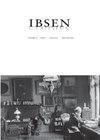When Nora Stayed: More Light on the German Ending
IF 0.1
0 THEATER
引用次数: 6
Abstract
Henrik Ibsen’s A Doll’s House (Et dukkehjem. Skuespil i tre akter, 1879) owes its worldwide reputation to the last scene, where Nora leaves her husband and children. A little less known is the German, alternative ending of Nora – the title commonly used in the German speaking world – where she stays. In the field of theatre studies, this ending is commonly recognized. The fact that Ibsen himself wrote it in 1879 – and tolerated its performance for a while – also belongs to established knowledge. The circumstances of the genesis and distribution of this very special piece of text have, however, not yet been presented in a manner giving attention to all aspects. My main arguments are:当诺拉留下来:对德国结局的更多了解
Henrik Ibsen的《玩偶之家》(Et dukkehjem.Skuespil i tre akter,1879)在世界范围内的声誉归功于最后一幕,诺拉离开了她的丈夫和孩子。鲜为人知的是Nora的德语替代结尾——德语世界中常用的头衔——她住在那里。在戏剧研究领域,这种结局是公认的。事实上,易卜生本人在1879年写了这本书,并在一段时间内容忍了它的表现,这也属于既定的知识。然而,这段非常特殊的文本的产生和分布情况尚未以关注所有方面的方式呈现。我的主要论点是:
本文章由计算机程序翻译,如有差异,请以英文原文为准。
求助全文
约1分钟内获得全文
求助全文

 求助内容:
求助内容: 应助结果提醒方式:
应助结果提醒方式:


